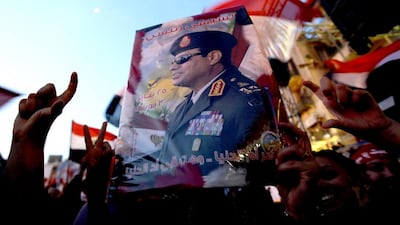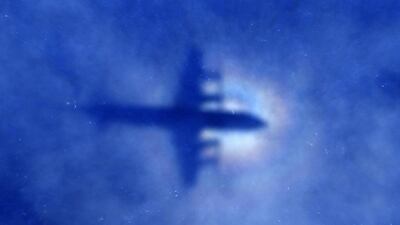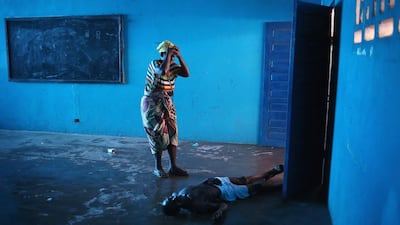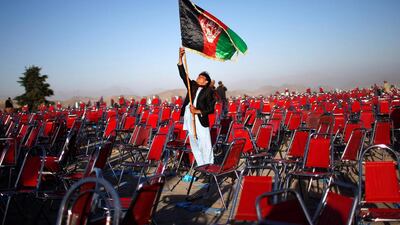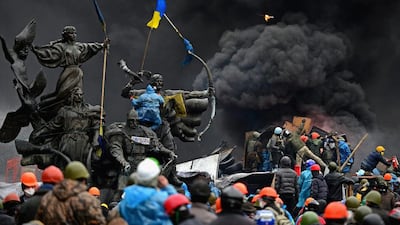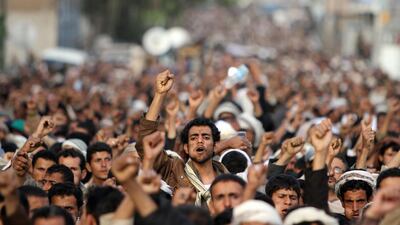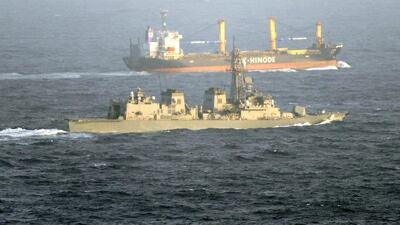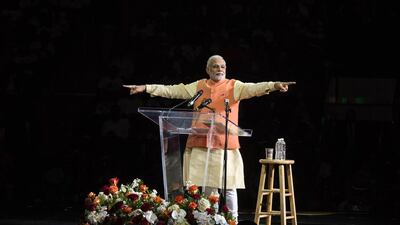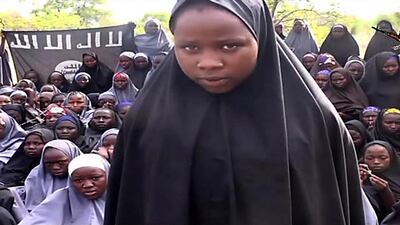2014 was a turbulent year. Stories that unmasked despicable horrors - deadly diseases, abductions, suicide bombings - made the headlines this year, but there are bright spots amid the coverage of atrocities, including a change coming in India and hope for an end to piracy in the Horn of Africa. These are the stories that captured your attention this year.
EGYPT: A hopeful search for stability
A new constitution that meets the aspirations of Egypt’s liberal and pro-democracy advocates, a new president on whose shoulders ride the hopes and fears of a nation and an ousted leader whose acquittal in a murder case sparked renewed violence and raised questions about retribution: 2014 has been an eventful year.
Egypt began 2014 with a referendum on a constitution to replace a conservative one hurriedly drafted and adopted in late 2012 by Islamists loyal to then-president Mohammed Morsi. The latest document, drafted by a panel that is dominated by liberals and secularists, was adopted by 98.1 per cent of the votes in the referendum but on a modest turnout of just 39 per cent.
The document guaranteed freedoms and human rights, and curtailed the usually wide powers of the president’s office and empowered the legislature to impeach the president. However, critics say the document has so far proven to be no more than ink on paper, with human rights being trampled on by the police, while the president, Abdel Fattah El Sisi, enjoys seemingly unlimited powers in the absence of an elected legislature. Parliamentary elections are expected early next year.
El Sisi ended months of intense speculation and announced his presidential nomination in the spring. The election was held in May and El Sisi, a career infantry officer who had studied in Britain and the United States, won a landslide victory that, in effect, restored a tradition dating back to the 1950s of men of military background occupying the land's highest office.
The first six months of his four-year term have been marked by some modest, yet crucial, improvement in the ailing economy, with a partial recovery in the vital tourism industry and steep cuts in state spending after his bold decision to greatly reduce state subsidies on fuel.
However, 2014 also saw the insurgency waged by Islamist militants sympathetic to Morsi intensify, with attacks against troops and security forces in the Sinai Peninsula growing more deadly – and spreading across the rest of the country.
As November drew to a close, a criminal court dismissed a murder case against Hosni Mubarak, the Egyptian leader forced out by a 2011 uprising. The ruling, concerning 900 protestors killed during 18 days of unrest in 2011, ignited street protests in which at least two people were killed in Cairo – and rekindled the thorny issue of retribution.
* Youssef Hamza
MISSING PLANE: A flight to nowhere
“Goodnight, Malaysian 3-7-0.”
Those were the last words heard from one of the pilots of the Malaysia Airlines plane that disappeared without a trace on March 8.
There was no distress call. Just a routine sign-off as MH370 left Malaysian airspace to enter Vietnam. No one heard from the plane again.
Conspiracy theories abound over the missing Boeing 777 that was en route to Beijing from Kuala Lumpur, carrying 239 people – nearly two-thirds of them from China.
Was it stolen, hijacked or taken down by a rogue pilot?
Minutes after its last transmission, the plane’s communication systems were shut down.
Further evidence showed the jet made a U-turn towards the Malacca Strait an hour after take-off, and probably plunged into the Indian Ocean after running out of fuel.
“These movements are consistent with deliberate action by someone on the plane,” Malaysia’s prime minister Najib Razak said one week after the incident.
Malaysia has come under intense criticism, with relatives of those on-board accusing authorities of holding back information and mismanaging the search.
The operation – aviation history's most expensive and extensive – brought together the world's top aviation minds and deployed the most advanced technologies and equipment, as 26 countries coordinated efforts on an unprecedented scale.
Millions of dollars have been poured into it, thousands of man hours spent, yet no trace of the plane has been found except for a few false sightings.
Australia, which is leading the operation, has vowed to press on.
“We will not give up until we have found what’s left of flight MH370,” said Australian prime minister Tony Abbott in September.
The loved ones of victims have not given up either.
“Without proof of a crash and without any kind of bodies, we have to hold out hope there are still passengers alive,” Sarah Bajc, the girlfriend of a passenger, told NBC News six months after the plane vanished.
* Joanna Tan
EBOLA: Reeling from the strain
On March 22, 2014, the World Health Organisation (WHO) declared a major outbreak of Ebola haemorrhagic fever in Guinea, West Africa.
Since then, about 5,500 people have died – including more than 150 health workers – and the world has watched as countries crumbled under the strain of the virus.
The worst affected have been Guinea, Sierra Leone and Liberia – places where the health infrastructure was already in a terrible state even before thousands of Ebola patients began demanding treatment.
Many of the hospitals are without reliable power and water, and nursing staff have made desperate calls for adequate equipment, calls that have largely fallen on deaf ears.
It was left to Médecins Sans Frontières (MSF) to set up temporary clinics with separate areas for suspected patients, infected persons and the dead, whose bodies are most infectious.
The virus, first identified in 1976 near the Ebola river in the Democratic Republic of Congo, causes a high fever, body pain, extreme tiredness and a loss of appetite.
It has a high fatality rate if patients are not treated early.
The WHO has been heavily criticised for being too slow to respond to the pleas for leadership, financing and aid. Those working on the ground, including MSF, begged for funding to build hospitals and treatment centres and to run public awareness campaigns.
Governments and wealthy individuals have donated millions of dollars to the cause, but have faced a barrage of criticism from those on the ground, who say it has come too late.
In September, the US president Barack Obama said the epidemic was a “threat to global security” and announced he was dispatching 3,000 uniformed personnel.
Later that month, the UN Office for the Coordination of Humanitarian Affairs said it needed almost a billion dollars to tackle the disease for the following six months.
Only a portion of this has arrived.
The epidemic has also raised questions about the ethics of using untested medicines after a special medical committee agreed to use a trial medicine that had previously only been tested on monkeys to cure two American missionaries. Some of world's biggest pharmaceutical companies are now working to create a vaccine, which could be rolled out in large trial phases next year in the hope of slowing the death toll.
* Mitya Underwood
AFGHANISTAN: A country in fragile condition
The year 2014 has ended in predictably bloody fashion in Afghanistan, with a series of attacks across the country underlining the Taliban’s intention to fight on through the winter and beyond.
Suicide bombings have become a regular occurrence in Kabul in recent weeks, the sound of the explosions echoing across the city as if to remind everyone that there is no escape from the war. But it is in rural areas where the conflict is at its worst, with insurgents, criminals and pro-government militias all contributing to the growing violence.
Although the true number of civilians killed in fighting this year may never be known, the UN said that deaths and injuries were up by a quarter in the first six months of 2014. Casualties among Afghan security forces have also been at unsustainable rates as the often rapacious police and army endure the burden of the withdrawal of most foreign troops. Meanwhile, opium cultivation and production in the country is at record levels.
Yet despite all this, it could have been so much worse. A bitterly contested presidential election that had threatened to plunge Afghanistan into chaos eventually ended with the country's first democratic transfer of power. A fragile national unity government now exists.
Faced with the insurgency, internal discord and an economy in sharp decline, it will have its work cut out in the months ahead. If the administration can defy the odds and survive in the long-term, the international community will have at least helped to give Afghanistan something to build on.
In many ways, 2015 will be a defining moment. About 12,000 foreign troops will be left in the country and the perception in the West will be that the bloodshed is over. For Afghans, however, nothing could be farther from the truth.
The Taliban will increase the pressure on the government and its security forces, determined to see if they will crack. Any chance of meaningful peace talks are a fantasy until the insurgents learn the results of their military efforts.
Having seen Iraq unravel, the US appears to be waking up late to the trouble in Afghanistan. American president Barack Obama’s recent decision to partially expand the remit of his residual force is a sign that Washington knows the situation is worse than it lets on in public.
The problem is that there can be peace only if the occupation ends. But ending it also risks pulling the country deeper into the mire.
* Chris Sands
UKRAINE: A deadly stand-off
The downing of a passenger plane over eastern Ukraine in July encapsulated an ongoing power struggle that has seen the former Soviet state torn apart by civil war.
Malaysia Airlines flight MH17 is believed to have been hit by a surface-to-air missile fired from separatist territory before it went down, killing all 298 people on board. But even today the Ukrainian government, supported by the European Union, the United States and other western countries, is locked in a dispute with Russian-backed separatists over who was to blame.
The incident recaptured the world’s attention after months of violence and political stand-off were showing no signs of letting up.
Fighting was sparked by the toppling of Ukraine's president Viktor Yanukovych in February following violent protests opposing his pro-Russian government. The protests began peacefully in November 2013 after Yanukovych's cabinet abandoned a trade agreement with the EU in favour of closer cooperation with Russia.
A western-backed interim government was installed in its place but less than a month later the country’s Crimea region was annexed by Russia.
Pro-Russian separatists in Ukraine's Donetsk and Luhansk regions declared independence soon after, and government troops have since been caught in an eight-month battle to regain the country's eastern territories.
The West accuses Russia of supporting the separatists with weapons, cash and manpower.
Ceasefires have come and gone, and in recent weeks Ukraine has seen a dramatic rise in violence. More than 4,600 people have now been killed and nearly a million driven from their homes.
The global balance of power has also been rocked, with relations between the West and Russia at their chilliest since the end of the Cold War.
Today, the Russian economy is on the brink of recession, largely caused by EU and US sanctions imposed on the country in response to its involvement in Ukraine. But Russia's president Vladimir Putin, who accuses western countries of exploiting Ukraine to destroy Russia, appears undeterred. Just last month Nato said Russian military equipment and combat troops were entering Ukraine in some number.
The only hope for peace in the new year would seem to be the thawing of relations between the West and Russia. But someone has to blink first.
* Laura Mackenzie
YEMEN: Uncertain future in the hands of rebels
It was supposed to be a year in which Yemen continued its transition from decades of dictatorship. But in September, Shiite Houthi rebels captured the capital Sanaa and continued their military campaign into central Yemen.
They mainly battled tribal fighters linked to an Islamist political party Al Islah and also Al Qaeda. Reconciliation talks with Al Islah, a Muslim Brotherhood offshoot, only began after the Houthis had gained the upper hand.
While the power shake-up in Yemen might resonate less strongly than political changes in countries such as Iraq and Syria, it is likely to have broad ramifications in the region in the coming months. Houthis now hold influential positions within the government formed after their takeover of Sanaa. The future of Yemen – including the fight against Al Qaeda and the possibility of greater regional autonomy – could be dictated by their will.
While some military commanders fought the Houthis, others quickly surrendered. In at least some cases, the commanders who surrendered were reportedly loyalists of Yemen's former president Ali Abdullah Saleh, removed by a popular uprising in 2012. There was widespread speculation that Saleh had helped to facilitate the Houthi takeover as vengeance for his removal. In November, the United Nations imposed sanctions on Saleh and two Houthi military leaders for destabilising the country and obstructing the political process.
The current president Abdrabu Mansur Hadi continues in office, but the real power in Sanaa now lies with the Houthis. The group formed “resistance committees” and placed armed men at government ministries, the airport, central bank and border posts. They have also captured the key Red Sea port of Hodeidah.
This is the first time the Houthis, who receive some support from Iran, met such success since launching a series of uprisings in 2004. However, they will face difficulties in maintaining gains in areas outside Sanaa and their traditional strongholds in Yemen’s north.
There will also be other challenges: the Southern Separatist Movement is on the streets in Yemen's south. Demonstrators demand independence or greater autonomy.
The rebels may soon have to contend with a rebellion of their own.
* Justin Vela
PIRACY: Seeing off the pirates
As a determined international effort claims substantial success in tackling the scourge of piracy off the Horn of Africa, the problem has shifted in modified form to the west coast of the continent.
Whereas pirates typically attacked commercial shipping in the Gulf of Aden and Arabian Sea, taking crews hostage and demanding huge ransoms for their release, oil tankers are increasingly being targeted off West Africa. Fuel is siphoned off the vessels and sold on the black market, with Nigerian gangs suspected of carrying out most of the attacks. But while this form of piracy, known as "oil bunkering", is a growing menace, the West African pirates also indulge in hostage-taking and basic maritime theft, boarding ships to rob crews and steal equipment.
An investigation by CNN revealed the case of Wren Thomas, the United States skipper of an oilfield supply vessel who was held with his ship’s engineer for 18 days in Nigerian swamps and jungles. A US$2 million (Dh7.35m) ransom was initially demanded, though it is believed less than half was eventually paid. He described his captors as threatening and “unstable”, some chain-smoking marijuana or crack cocaine, and says US investigators told him the ransom may have been channelled to the extremist Boko Haram group.
Meanwhile, piracy off the Horn has diminished as a result of patrols by a coalition of international navies and the now commonplace use of armed guards. Only 23 vessels were reported to have been attacked last year, compared with 237 in 2011, according to the Oceans Beyond Piracy project, which is run by the US-based NGO One Earth Future.
Daren Knight, a former British marine commando and now managing director of Knight Associates, an Irish firm of security consultants, warns against complacency, even in waters that now appear safer. "Having worked against Somali-based maritime piracy operationally and strategically, I do fundamentally agree that incidents have dropped because … piracy is no longer financially viable for criminals," he wrote for the Mashable news website.
He cited the coalition patrols, the use of civilian armed guards, improved knowledge and training of commercial ship operators and crew, and the greater stability of Somalia. But while he thinks a resurgence of kidnappings and ransom demands is unlikely, he feels the risk of robbery at sea would present itself again if patrolling ends.
The European Union believes piracy off the Horn has been controlled, not eliminated. Member states recently agreed to extend their anti-piracy operations until 2016, using patrol aircraft as well as ships. Piracy is big business, costing shipping and insurers US$16 billion (Dh58.76bn) a year on some estimates.
* Colin Randall
RISE OF MODI: Promises to keep
India's consciousness was dominated by one man in 2014, Narendra Modi: first as a barnstorming, divisive prime ministerial candidate; then as a leader who won a massive electoral mandate in May; and finally as the country's 16th prime minister, under intense scrutiny to see how dramatically he can change India's fortunes.
Between January and April, in full electoral mode, Modi was a force to be reckoned with. In his campaign rallies, he outlined grand plans for reviving India's economy, which has slowed worryingly over the previous three years. He attacked the Congress party, which had headed the Indian government since 2004 and whose fortunes had declined sharply amid its alleged corruption and inefficiency.
Shrewdly, he did not proclaim the glories of Hindu nationalism, as his critics expected; instead, he spoke the language of development and economics, endearing himself to a public that had grown frustrated with Congress’s mismanagement. Modi won, and he won big; his Bharatiya Janata Party alone won 282 out of the 543 seats in the Lok Sabha, the lower house of parliament.
Since Modi's victory, however, New Delhi has felt as if it has entered a strange political limbo. The new government has not delivered, or even begun to initiate, the fundamental policy shifts towards a freer economy that Modi had promised. The prime minister has also not overtly pushed the Hindu agenda of his party, although minor controversies have regularly cropped up, such as when the government replaced German with Sanskrit as a third language option in one particular batch of public schools. Largely, Modi has been travelling overseas – most memorably to the United States in September, where he addressed a capacity crowd at Madison Square Garden in New York. In a way, he has remained in campaign mode, continuing to sell himself and his government to Indians at home and abroad, going electioneering in state polls, and coining slogans and crafting photo opportunities.
In the year ahead, India will watch Modi with even greater keenness, to see how he buckles down to the task of governing. Much is required of him. India’s growth rate slowed to 5.3 per cent in the quarter ending September, down from 5.7 per cent the preceding quarter. The country’s infrastructure is still insufficient and ensnarled in bureaucracy. The difficulty of doing business in India, because of archaic and myriad regulations, continues to stifle innovation. These are the kind of problems Modi promised, during his campaigns, to resolve, and they loom ahead of him in 2015.
* Samanth Subramanian
BOKO HARAM: The new face of hate and intolerance
In the 12 years since its creation, Boko Haram has become a spectacularly ruthless force in Nigeria, with the blood of more than 4,000 murdered civilians on its hands.
Boko Haram’s full name Jama’atu Ahlis Sunna Lidda’Awati Wal-Jihad translates as People Committed to the Prophet’s Teachings for Propagation and Jihad. Assessments of its combat strength range from a few hundred to several thousand. It was born against a background of military repression in northern Nigeria, and in the past year the Islamist group appears ever more intent on carrying out atrocity upon atrocity in which the greater the loss of life, the better.
One of Boko Haram's acts of terror brought with it fierce global condemnation. On the night of April 14, the group kidnapped female pupils from the government secondary school they attended in the town of Chibok. Figures vary but Nigerian police have put the number of girls abducted at 276; more than 50 have managed to escape since.
Michelle Obama, the wife of the United States' president, was among politicians and celebrities who joined an online campaign – bring back our girls – backed up by public demonstrations in the West.
The response in Nigeria’s capital was far more muted, with the president Goodluck Jonathan facing criticism at home and abroad for allegedly not taking the girls’ plight seriously.
The Boko Haram leader Abubakar Shekau said in a propaganda video released three weeks after the kidnappings: “Allah instructed me to sell them … I will carry out his instructions.”
Subsequent reports have stated that the non-Muslim kidnap victims – the majority – have been made to convert to Islam, with many forced into marriage with the group’s fighters.
In mid-October, after the Nigerian army announced a truce with Boko Haram, there appeared to be official support for suggestions the girls were about to be freed following negotiations involving Saudi Arabia and Chad. Nothing came of this and the group's bloody activities have continued unabated.
* Colin Randall
